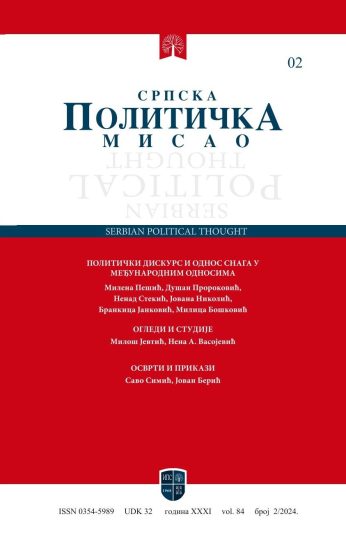Serbian Political Thought
Kosovo and Metohija or the European Union ‒ a rhetorical dilemma in the Serbian political discourse
Abstract
As the loss of Kosovo has been de facto re-inflicted in recent years, the question should be raised as to how great an influence the Kosovo myth wields today. It is particularly interesting to consider the issue in the context of European integration and the fact that recognition of Kosovo and Metohija’s self-proclaimed independence is usually stated as an essential condition and a key obstacle to Serbia’s accession to the EU. It is an undisputable fact that Kosovo and Metohija and the Kosovo myth are a part of culture, history, religion, and folklore of Serbian people, and it is without doubt difficult to renounce all that, even if personal and collective prosperity is offered in lieu of it, which is deemed by a certain portion of the Serbian public to come as a result of the accession to the EU. The aim of this paper is to establish which portion of public opinion is willing to make such a sacrifice in relation to the current attempts at resolution of the Kosovo question. It is the authors’ ambition to answer the following question: To what extent does the position on the status of Kosovo and Metohija influence the public opinion on Serbia’s membership in the European Union? With an intention of answering the research question the authors rely on the data acquired through empirical-quantitative study The Notions of the EU and Russia in the Serbian Public 2018, Institute of Social Sciences Belgrade, where a structured on-line questionnaire was used as a means of data collection. The study results clearly indicate the popular support for Serbia’s accession to the EU while at the same time the method of resolution of the Kosovo question deeply impacts the public opinion on Serbia’s membership in the EU. A conclusion can be drawn that, if the public is presented with the choice between Kosovo and the EU, the certainty of citizens opting for the EU will rapidly decline.
References

